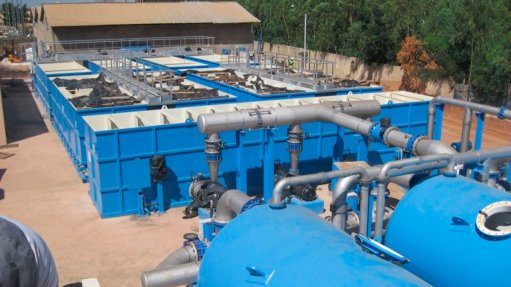
MODULAR SOLUTION Advantages of using the prefabricated UCD units include reduced on-site construction time and simplified civil work
International water-treatment solutions specialist Suez has noted a significant increase in demand from small and medium-sized modular water treatment plants to optimise the construction and operation of their water and wastewater treatment facilities, particularly on the African continent.
“Water boards and industrial companies are becoming more interested in using modular systems in Africa, where infrastructure is scarcer, projects are long-term and companies require a secure water supply fast and the moving of assets, if necessary,” says Degrémont GM Remy Jaffray.
He therefore highlights the advantages of using Suez’s modular, skid-mounted water and wastewater treatment turnkey solutions, which are also known as UCD compact units.
The UCD plants use conventional water treatment technologies and include easy-to-operate equipment. They can be used for end-to-end water treatment with coagulation, flocculation, lamellar clarification, dissolved air flotation, pulsed clarification, sand filtration and disinfection. The UCD plants are delivered in the form of one or more factory-assembled skids.
The units can be customised from 115 m3/d to 22 000 m3/d to manage various capacities in diverse applications for water and wastewater treatment processes.
“Key advantages include reduced fabrication lead time and on-site construction time and simplified civil work, owing to the modularity and prefabrication for the skids. This allows for reduced capital investment and operating costs and, therefore, a reduced risk to all project stakeholders,” stresses Jaffray.
He further emphasises that this advantage also allows for the operation to be secured, compared with a standard, conventional engineering solution.
UCD Demand
Suez was recently contracted to supply five UCDs to Côte d'Ivoire, notes Jaffray. The company will deliver the UCDs at the beginning of 2016.
The company also commissioned a 22 Mℓ/d water treatment UCD, with a 1 000 m2 footprint, in Kalabancoro, in the capital city of Bamako, Mali, in 2014. Delivery and installation of the UCD took ten months from purchase order to end of the commissioning.
Jaffray further emphasises the success of the swiftly executed project that the company completed last year in Saudi Arabia.
“The Riyadh project entailed the supply of modular skid-mounted units to 14 different brackish- water treatment sites for the National Water Supply Company of Saudi Arabia, valued at €40- million,” he tells Engineering News. Each module has a capacity of five-million litres a day.
This water treatment solution comprises a reverse-osmosis system that was designed with evaporative cooling towers to cool the water, pretreatment that includes media filtration, chemical dosing and post-treatment comprising chlorine and remineralisation. The reverse-osmosis system includes a filter cartridge, a booster pump, valve and instrument manifold pressure vessels and membranes.
“Suez delivered the project in seven months, from when the contract was signed to the end of the commissioning period, compared with the construction of a factory with this capacity that would have required 24 months,” Jaffray concludes.